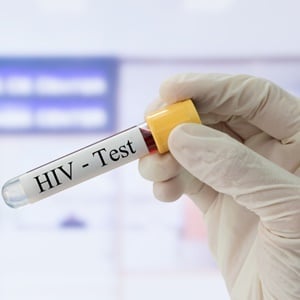Je, kuna umuhimu wa Serikali duniani kote kuamua kulifanya suala la upimaji wa UKIMWI kuwa suala la lazima!
Ni suala ambalo mara kadhaa limekua likileta mjadala mkali kwa wanaoangalia maslahi ya jamii juu ya umuhimu wa kupima dhidi ya watetea haki za binadamu kuwa uamuzi huo ni kinyume na haki za binadamu.
Kufuatia takwimu za UNAIDS watu zaidi ya milioni 36.9 duniani wanaishi na maambukizi ya virusi vya UKIMWI. Takwimu hizo zinaonyesha kuwa Afrika ya Kusini ndio nchi inayoongoza kwa maambukisi hayo ikiwa na jumla ya waathirika milioni 7.2.

Zaidi ya asilimia 50 ya waathirika wa ugonjwa wa UKIMWI wa dunia nzima wanatokea Afrika Mashariki na Kusini mwa Afrika. Kwa hiyo linapokuja suala la upimaji wa lazima wa ugonjwa huo katika ukanda huu sio suala linalohitaji mjadala zaidi ya utekelezaji huenda ikalenda unafuu wa makali ya ugonjwa huo.
Mapema mwaka 2018.
Earlier this year two Ugandan ministers were backing the call for compulsory HIV testing. The ministers in question were Sarah Achieng Opendi, the State Minister of Health, and Janat Mukwaya, the Minister of Gender, Labour and Social Justice.
According to an article in The Guardian, Mukwaya believed that compulsory HIV testing would allow the stigma surrounding the epidemic to diminish and that through the Ugandan government’s test and treat initiative those affected would receive the help that they need.

The Forgotten Fighters of the AIDS Epidemic
AIDS and its legacy have devastated millions of people around the globe since the 1980s. While hard-fought progress has been made, every day lives from every section of society are still being lost to the condition.
In August, Zambian President Edgar Lungu announced that HIV testing was now compulsory in his country. According to News24 Lungu said, “I must admit that there were some colleagues who felt that this policy would infringe on human rights but there [is] no one [who] has the right to take away somebody’s life. Just the same way we don’t consult you for consent when we are testing for malaria, we will go ahead and test you for HIV and we will counsel you and if you are positive; we will commence you on treatment.”
Both announcements by these countries were met with stark opposition and the comments and decisions made were quickly retracted. However, the question about whether or not HIV testing should be compulsory still lingers.
Public debate
Researchers investigating the pros and cons of compulsory HIV testing for pregnant women found that women, children and society as a whole would benefit from mandatory testing.
However, they felt that it should not be something used by governments simply for the sake of testing but as a means to stop the spread of infection and to treat those infected.
A debate between Médicins sans Frontières (Doctors without Borders, MSF) and the University of Cape Town’s Students’ Health and Welfare Centres Organisation (SHAWCO) highlighted the different viewpoints of those in favour and those against compulsory HIV testing.
According to Dr Gilles van Cutsem from MSF, mandatory testing could slow down the rate of new infections and help those who were unaware of their HIV status.
Professor Leslie London, director of the School of Public Health at UCT argued that compulsory testing was an abuse of human rights and that there were other methods available to encourage people to get tested.
In an interview Health-e news, labour lawyer Marlene Potgieter notes that "HIV/Aids is mired in folklore, suspicion and mistrust and the fact that it is a disease that comes from having sex (mostly). It is something that is not spoken about openly... People simply disappear quietly from the workplace and die in silence."
Confidential HIV testing is considered as a human right. The UN’s International Covenant on Political and Social Rights states that one’s human rights may be limited if it’s a matter of public interest. This limitation may only be initiated if it serves an objective purpose and there are no other alternatives to solving the problem.
Know your status
Because we live in a country with such high HIV rates, South Africans are regularly encouraged to get themselves tested. Knowing your status can save the lives of those around you, from your partner to your unborn child. Various clinics and health centres around the country offer free, confidential HIV testing. Last year BIOSURE, the HIV self-test, was legally approved, making it that much easier for people to get tested in private.








